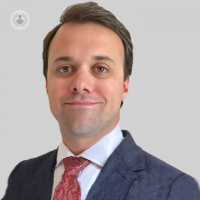Spinal disc replacement or spinal fusion? Solutions to back and neck pain
Written by:Both spinal disc replacement operations and spinal fusions are effective treatment options for back and neck-related problems and pain. We recently spoke with revered consultant orthopaedic spinal surgeon, Mr Will Kieffer, who, in our latest article here, explains the difference between a spinal disc replacement operation and a spinal fusion.

What is the difference between a spinal disc replacement and a spinal fusion?
When someone has a disc herniation in their neck that is causing them arm pain, the main ways of addressing it are from the front of the neck or the back of the neck. Going through the front of the neck requires removal of the disc, which is one of the most common ways of performing the procedure.
Therefore, once the disc has been removed, the two options are to either put a spacer in between the two bits of bone to convince them to fuse together. The second option would be to replace the disc.
When would either a spinal disc replacement or a spinal fusion be required?
The most common reason for someone needing one of these two operations is what we call brachalgia, which is a medical term for someone presenting with pins and needles and pain that radiates from their neck and all the way down their arm, often even towards their fingers.
This is associated with pressure on the spinal nerve in the neck on either the left or right-hand side that causes squeezing.
What is involved in the surgery process for both procedures?
Broadly speaking, the two procedures are very similar. Both involve an incision in the front of the neck, usually on one side, and then getting to the front of the neck and removing that disc. After this, the spacer (for spinal disc replacement) or the fusion block (for spinal fusion) would be inserted into the area where the incision has been made.
Both operations do involve an overnight stay, although, if your procedure takes place in the early part of the day, then it’s possible for you to have a day-case surgery.
Which of the two would you say is more beneficial for patients?
A spinal disc replacement requires the neck top still be supple and still have movement, in order for that movement to be preserved. The principle of disc replacement is that it keeps that seven to ten per cent of movement that you would otherwise lose if you fused that disc space together.
However, this does mean that the neck cannot be too stiff beforehand and that there cannot be too much compression from other sources.
A spinal fusion, meanwhile, is a good operation and is certainly suitable for a lot of people. The difficulty, however, comes if you’re doing more than one disc. The rates of fusion do increase, and therefore, disc replacements remove that need for the two bones to fuse together as we’re preserving the movement within the neck.
What are the main risks and side effects of both procedures?
The risks involved with both are quite similar. The main difference between the two is that, with a spinal fusion, the bones sometimes take a long time to fuse together. A disc replacement, meanwhile, can unfortunately wear out or fail as the movement occurs.
Otherwise, there are what we call approach-related considerations. Of course, at the front of the neck, we are very close to some quite important structures and they can be bruised or damaged slightly.
How long is recovery time from both operations?
I would normally expect people to stay in hospital for at least one night at most if everything has gone swimmingly. Patients should avoid any lifting for at least six weeks. Normally, people can get back to driving after around five to six weeks following either spinal disc replacement surgery or spinal fusion surgery.
It can be quite common to experience some pain in the back of the neck and muscle pain around the neck. This, however, generally settles down quite quickly.
Mr Will Kieffer is a highly esteemed consultant orthopaedic spinal surgeon who is a trusted expert when it comes to spinal problems. Consult with him today via his Top Doctors profile.


